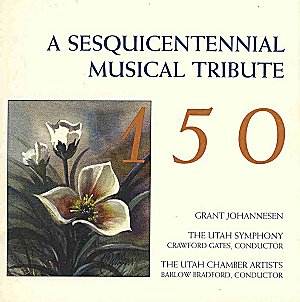Here
is an hour and a half of 20th century music that articulates a
cultural voice quite distinct from the syncopation and razzle
of New York, the latino or bluesy rasp of the South or the mystical-meditative
sway of the Californians. These Utahn composers write accessibly,
brightly and with engaging sincerity. I am sure there must be
some Salt Lake City composers who operate at the avant-garde.
In any event they are not represented here though Shepherd did
not always write as romantically as this. They are all, in any
event, well worth hearing.
Cundick's
flat-out overture, brimming with vitality, occupies the same sanguine
territory as Howard Ferguson's Overture for an Occasion,
Moeran's Overture to a Masque, Chagrin's Helter-Skelter
and Foulds' Le Cabaret. The light concert overture
is alive and well in Utah and this work can stand as a modern
equivalent of the same genre we normally associate with Rezniček,
Suppé and Smetana. I detected no specifically American gestures
so I would not group it with Bernstein's Candide or Schuman's
American Festival Overture.
After
the overture comes that virtuoso work by Leroy Robertson -
the American Serenade for strings - originally for string
quartet. Abravanel premiered the string orchestra version in 1957
and it works very well in that instrumentation in much the same
vein as the Wirén and Larsson string serenades and the
Elgar Introduction and Allegro. There is meant to be a
prairie Western element to this but it is not at all assertive
unlike in Roy Harris's Folksong Symphony (by the way this
was recorded for EMI by the Utah Symphony with Abravanel conducting).
The Utah Symphony make a very fair showing but the mind's ear
can imagine an even more virtuoso effort and the violin tone is
not quite the luxury article we might have hoped for.
However
the choral singing in Cundick's contemplative To Utah
is beyond adverse criticism - a smooth blend, perfect coordination
and intonation and a reverential concentration. The music is very
close to the choral Vaughan Williams of Dona Nobis Pacem and
of Bax's Mater Ora Filium. There is much delicate reflection
in this work and little of the monumental - witness the surprising
whisper-singing of General Albert Sidney Johnson Marches through
Salt Lake City. The Expansion movement is a superb
piece of writing for both chorus and orchestra which really captures
the horizon-challenging confidence and expansion of the Mormon
pioneers. It is a pity that the seven parts of this work were
not separately tracked.
The
Little Handcart by Janice Kapp Perry to words by Senator
Orrin Hatch is touchingly sentimental and is bound to bring a
lump to the throat with its simple story of the little boy who
died in the great 1847 trek of the Mormon pioneers to Utah. It
is rounded to perfection by the solo oboe's farewell - a tribute
to Barlow Bradford's arranging skills which guide us through Rutter-Finzi
territory. I had to play this again the moment the disc had ended.
The same team produce the march-hymn Our Utah Pioneers with
its echoes of Onward Christian Soldiers and Scandinavian
choral singing.
Grant
Johanessen then plays two piano solos by Arthur Shepherd.
The first is an impressionistic piece close to the nature portrayals
of Moeran and John Ireland. It celebrates Lake Placid in upstate
New York but this highly attractive tableau, with a dusting of
Medtner-like gestures, can safely be enjoyed by anyone who likes
RVW's Lake in the Woods or Bax's Moy Mell. Gigue
Fantastique dates from 1931. It has outdoor élan -
that countryside freshness that also abounds in Shepherd's Mountain
Lake. These two pieces make me hope that Johanessen will treat
us to a generous collection (or two) of the solo piano music of
Utahn composers.
The
music of Crawford Gates, whose Horn Sonata so impressed
me (see review of Tantara Records disc) is always worth hearing.
He comes up with a most original concept in the unconventional
piano concerto Pentameron. This traces the journey of the
three thousand Saints from their flight from the violence of Nauvoo
to the winter and mud of Iowa to the homecoming uplands of But
in our hearts - faith and joy triumph. The music has the character
of Moeran's Rhapsody No. 3 for piano and orchestra with
a touch of the enigmatic in Bax's Symphonic Variations.
There is no overt jazz influence rather the triangulation points
are Ravel and Constant Lambert in addition to the Brits mentioned
above. Once again a pity that this work is given in a single track
and not separated into the five episodes.
There
are very few coughs, by the way; a tribute to Utah's climate and
to the concentration induced by this always endearingly impressive
music. Highlights: the Cundick choral piece, Gates' discursive
and statuesque Pentameron and the superb performances of
the two Shepherd solos. I would now very much like to hear Shepherd's
orchestral Horizons (1927), the violin sonata (1920), the
second piano sonata (1930) and the Triptych for soprano
and string quartet (1925). I have already sung Robertson's praises
and we must hope also for recordings of his Trilogy, his
two symphonies, cello concerto and the reissue of Vanguard recordings
of his superb violin concerto and the powerful Hansonian oratorio
From the Book of Mormon.
The
notes are exemplary and highly detailed.
An
attractive anthology drawing on the undemonstrative conservative
melodic-romantic tradition but doing so with subtlety and imagination.
Rob
Barnett
